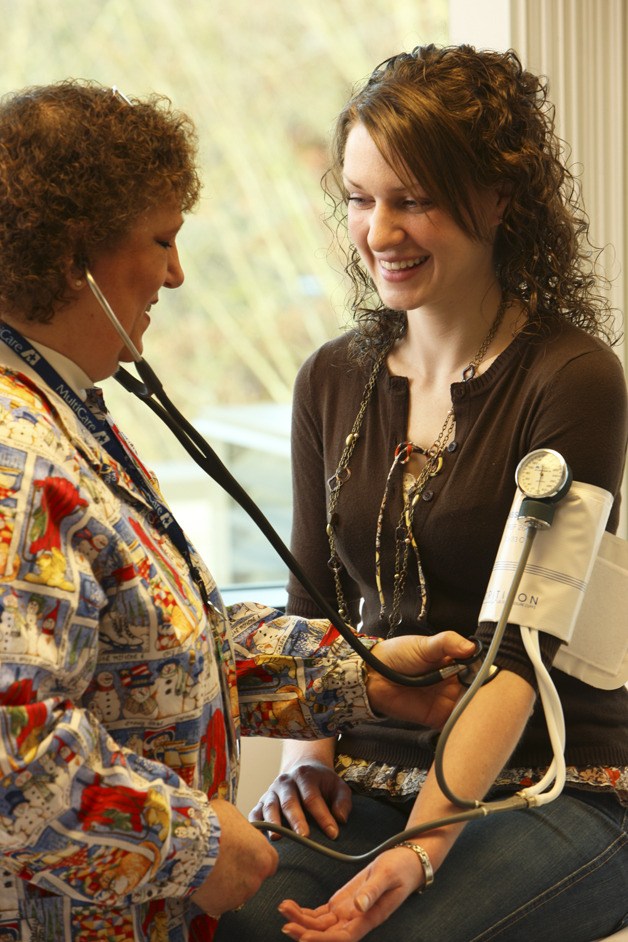Getting your blood pressure checked is one of the first things that happens when you see your doctor. It’s a basic indicator of health.
High blood pressure, or hypertension, is dangerous because it makes your heart work harder than it should to pump blood. High blood pressure can trigger many conditions that cause serious health problems. And many times it can cause damage without creating symptoms.
More than 74 million U.S. adults have been diagnosed with high blood pressure, according to the American Heart Association.
What does blood pressure do? The organs in your body get oxygen through your blood. They need it to survive. When your heart beats, it creates pressure that pushes blood through a network of arteries and veins. The pressure is the result of two forces. The first force occurs as blood pumps out of the heart and into the arteries that are part of the circulatory system. The second force is created as the heart rests between heart beats.
When your health care provider measures your blood pressure, he or she collects two numbers. The first number, called the systolic pressure, is the pressure of your blood being pushed through your circulatory system. The second number, called the diastolic, is your heart at rest.
Here’s a look at the ranges:
• Normal: less than 120/80
• Prehypertension: 120-139/80-89
• Stage 1 high blood pressure: 140-159/90-99
• Stage 2 high blood pressure: 160 and above/100 and above
A single reading that’s out of the normal range does not automatically mean you have high blood pressure. However, if your readings stay in a higher range over time, your doctor will want to discuss treatments, which likely will include lifestyle changes.
If, while monitoring your blood pressure, you get a systolic reading of 180 or higher or a diastolic reading of 110 or higher, wait a couple of minutes and take it again. If the reading is still at or above that level, you should seek immediate emergency medical treatment for a hypertensive crisis.
About 77 percent of Americans treated for a first stroke, 69 percent treated for a first heart attack and 74 percent with congestive heart failure have blood pressure over 140/90, according to the American Heart Association.
Why does it matter if the pressure is high? Healthy arteries are made of muscle and a semi-flexible tissue that stretches like elastic when the heart pumps blood through them. The more forcefully blood pumps, the more the arteries stretch to allow blood to easily flow. If the force of the blood flow is high for a long period of time, the walls become stretched. That could create several problems.
Vascular weakness: The stretched vessels could become prone to rupture, which causes strokes and aneurysms.
Vascular scarring: The stretched vessels could develop tiny tears that leave scar tissue. These tears can act like nets and catch debris such as cholesterol, plaque or blood cells.
Blood clots: Trapped blood cells can form clots that can narrow or block arteries. The clots can break off and block vessels and blood supply to different parts of the body. This could lead to a heart attack or a stroke.
Tissue damage: The arteries and veins on the other side of the blockage don’t receive enough oxygen and may suffer tissue damage.
Circulatory system strain: When vessels around your body get clogged and narrow, the pressure in your system is much greater. Over time, the increased work can damage the heart itself. The muscles and valves in the heart can become damaged and heart failure can result. And damage to vessels can mean that that your organs and your brain don’t get enough oxygen and can also be damaged.
High blood pressure can be treated, and with the help of your doctor, you can learn to manage it. And there are lots of ways you can help.
• Eat a healthy diet, which includes reducing salt intake.
• Get regular exercise and maintain a healthy weight.
• Keep your stress level low.
• Don’t smoke.
• Take your medications and follow your doctor’s instructions.
One of the best ways to help treat high blood pressure is to know you have it. According to the Heart Association, more than 20 percent of people with high blood pressure don’t know they have it.
Your health care provider can help you take steps toward becoming healthier and controlling your blood pressure. When was the last time you had your blood pressure checked?
Dr. Qudsia Khan practices internal medicine for MultiCare Health System.


